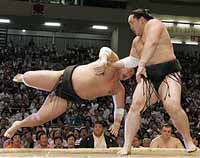Sumo's top star grapples with match-fixing scandal
Just when sumo's biggest star was set to assume his place among the sport's all-time greats a scandal surfaces to knock him off his game.

Mongolian Asashoryu, whose real name is Dolgorsuren Dagvadorj, won his 20th Emperor's Cup in January, putting the 26-year-old on pace to become one of the most dominant wrestlers in the history of Japan's ancient sport.
But now he's being accused of cheating.
Recent reports in weekly magazine Shukan Gendai have rocked the sumo world with claims that grand champion Asashoryu paid off his opponents to let him win.
Shukan Gendai, a popular-tabloid style magazine, claims Asashoryu paid opponents to lose in last November's Kyushu tournament, where he won all 15 bouts to capture his 19th title.
After conducting its own internal investigation and finding nothing unusual, the Japan Sumo Association said Thursday it will file a defamation lawsuit against the publisher of the magazine.
The JSA will file a suit against Kodansha Ltd., publisher of the Shukan Gendai, and will also demand that an apology be published for the allegations made in the report.
Asashoryu, meanwhile, is defiant.
"I have never done anything like that," Asashoryu told reporters. "It's really upsetting and terribly sad that after getting my 20th title they write something like this. Is this how you are rewarded for getting strong?"
Accusations of bout fixing in sumo are as old as the sport itself.
In the mid-90s, two wrestlers went public with claims of corruption and then both died mysteriously shortly after making the accusations.
Shukan Gendai has stood by its story, issuing a statement saying the report was based on information provided by reliable sources.
Mark Buckton, editor of Sumo Fan Magazine and a former wrestler himself, is skeptical about the reports.
"If you watch Asashoryu in practice, you realize he's at a completely different level from the other wrestlers," said Buckton. "Why would he have to resort to something like that? The facts in the article are cloudy at best."
Ever since bursting on the sumo scene in 2002, Asashoryu has dominated the sport like few others. To some Japanese fans, his rise to the top of the their national sport hasn't been easy to accept.
His brash, cocky style has irked some sumo traditionalists. He often pushes opponents off the ring even though they have already stepped out and the match is over. Before matches he stares down his opponent with a menacing look.
All this in a sport that places a heavy emphasis on humility and sportsmanship.
Compounding some of the resentment is the fact that sumo hasn't had a Japanese grand champion since Takanohana retired in 2003, reports AP.
Asashoryu has said he would like to pursue legal action. In past interviews, he has credited his success in Japan with a harsh upbringing in Mongolia that made him tougher and hungrier than his Japanese opponents.
Asashoryu, the only grand champion currently competing in sumo, is fifth on the all-time list of title winners. Grand champion Taiho, who retired in 1971, is first with 32 Emperor's Cups.
Subscribe to Pravda.Ru Telegram channel, Facebook, RSS!


